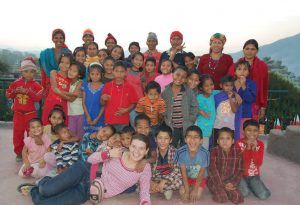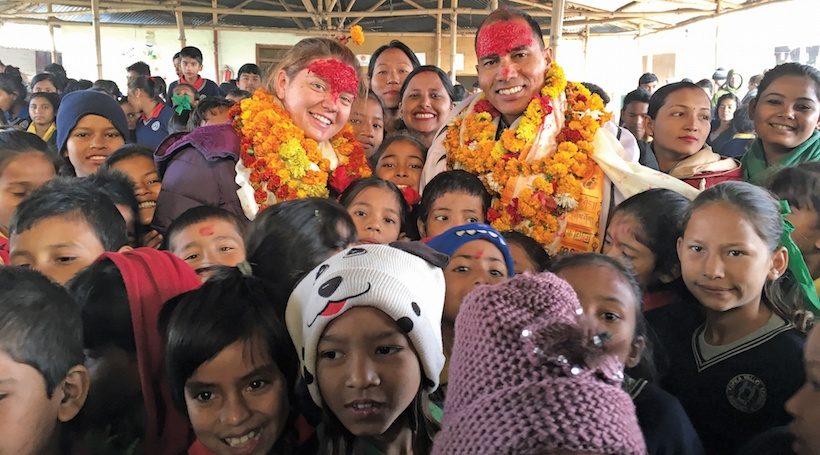When 29-year-old Maggie Doyne visited Nepal during what was supposed to be her gap year between high school and college, the Moorestown native was disturbed to witness impoverished children breaking stones in dry riverbeds to earn money. After talking to 6-year-old Hima, who broke stones instead of attending school, Doyne was inspired to forego college to help.
She asked her parents to wire her life savings ($5,000 in babysitting funds), and Doyne founded the BlinkNow Foundation, which makes a difference in the lives of Nepali children. Today, she’s the mother figure to more than 50 orphaned children who live in her Kopila Valley Children’s Home. The local school she founded, Kopila Valley School educates more than 350 local children. She’s won awards for philanthropy, including the CNN 2015 Hero of the Year and 2014 Unsung Heroes of Compassion Award, which was presented by the Dalai Lama.
If you hadn’t taken your gap year, would you have gone to college and followed a more conventional career path?
I was definitely a typical American teenager. I was a varsity athlete and the class treasurer with plans to attend college. I had a typical American childhood and received one of the best public school educations our system has to offer. There was no doubt I wanted to go college. That was the plan. The only thing was I wasn’t sure what I wanted to study, so it seemed irresponsible for me to take on that cost without a formal plan, but I’m sure I would have figured it out.
When you got to Nepal and had that meaningful moment with the young girl whose life you wanted to improve, did you suddenly realize the course of your life had changed?
It was a gradual process. It began when I first went to India and continued when I traveled to Nepal with the Nepali refugees I had met. When I got to Nepal, I began to notice the many orphaned children and child laborers. Seeing these children made me think of my own childhood and how it was so different from what these children were experiencing. I began to learn more and more about the astonishing number of orphans and impoverished children who lack an opportunity to receive an education. It’s when I met Hima that I realized I might not be able to help all of these children, but I could start with just one. But then I realized if I could help one, why not 10? Why not 15? Soon it became my dream to walk across the dry riverbed, where I first saw Hima, and not see a single child breaking stone.
What was it like telling your family that you weren’t going to return to New Jersey to attend college, and that you wanted to live halfway around the world in war-torn Nepal?
It was a long and hard conversation when I first told my parents. But in the end, they were very supportive. Like many parents, they had their moments of worry and concern, but they still rallied behind me.

Doyne cares for 50 orphaned children in Nepal
What do the children think of you?
Sometimes the children, arriving at Kopila Valley for the first time, have never seen a white woman before, so I definitely get some stares. The children are curious, but my differences have never stopped them from welcoming me; they are so kind, caring and happy.
I have a great relationship with the children at Kopila Valley School. The school currently educates beautiful children from the Surkhet region. It’s been amazing to watch them grow.
My children in the home call me Mom or Maggie Mom. We have a wonderful relationship. They keep me inspired and motivated every day. They are the reason I do what I do. I am constantly learning from them and watching as they develop into amazing and incredibly talented human beings.
What is a typical day like for you at Kopila Valley?
A day at Kopila Valley is crazy, but in the best way. It’s loud and chaotic, but there is so much love. I have an amazing team of Nepali aunties and uncles and volunteers who help me wake up the children for school and prepare them for the day – making sure the children brush their teeth, finish their homework and make their beds. We all see each other at breakfast, and then I’m off to work, and in and out of meetings for the majority of the day. I always try to carve out at least 30 minutes of the day for a dance party (they are very popular in our home), playing games or singing Taylor Swift with the kids when they get home from school. I see the kids again for dinner and for our family meeting that takes place every evening. After that, it’s a bedtime story, homework or chatting with the kids about their day. It’s busy and definitely a team effort, but I wouldn’t trade it for the world.
Do you find it’s a lonely job, being a mother to so many children, so far away?
I don’t feel lonely, and I think it’s because I have an amazing team that I can lean on for support. They have been with me through good and bad, and we share a very special bond. We’ve lived and worked together for years, and we really do consider ourselves a family.

Maggie Doyne accepted her CNN award last year in New York
You’ve won awards for your philanthropy. What do they mean to you?
These awards mean a lot to me. They are all for the children of Kopila and our amazing community. I always think: All of us have the power to create something to make the world a little better. The beauty of all of us is that we have talents and gifts – this just happened to be mine. I feel very lucky to have found my gift through my work in Nepal. I have created my little slice of heaven.
How do you stay in touch with family and friends in the States?
I am able to stay in touch with family and friends through social media and email. We have access to Wi-Fi at the home and school, thanks to the help of solar panels. We do occasionally experience outages, which can be frustrating, but the outages, conveniently, serve as the perfect reason to disconnect – something that is so hard to do these days.
Do you ever make it back to New Jersey to see family and friends?
I make a couple of trips back to the United States every year for fundraising, board meetings, speaking and press events. When I’m back, I like to relax and see friends and family. With that said, there’s always a lot to be done when I’m in the United States, so sometimes it can be hard to be low-key.
Where do you see yourself in 10 or 20 years? Is Nepal your permanent home?
I try to focus on the present – to live in the now. Right now, we are working to build an amazing campus to replace our existing one. My hope for the future would be to send happy, healthy and empowered young adults out into the world. Additionally, I would like my project to inspire others and serve as a model for education-based projects around the world.














